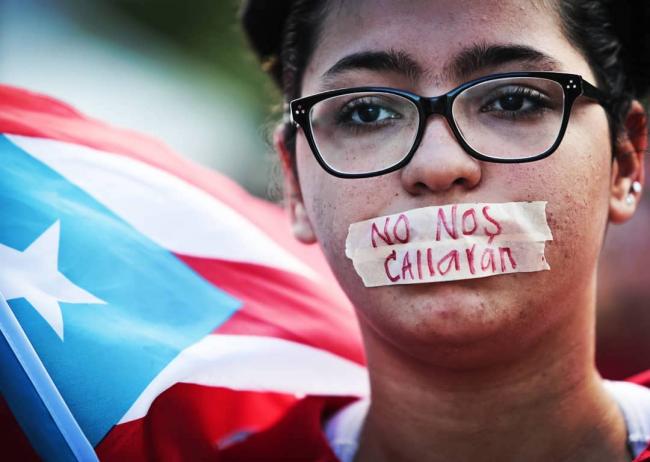
NACLA is launching a summer fundraising campaign. Click here to show your support.
On July 24, the streets of San Juan erupted in cheers as Governor Ricardo Rosselló announced his resignation in a televised address. Rosselló’s resignation was the culmination of nearly two weeks of protests by Puerto Ricans on the island and across the U.S. under the slogan “Ricky Renuncia,” following the leak of 889 pages of a group chat between Rosselló and and close associates, including members of his cabinet. In the chat, they mocked political rivals, feminists, queer people, victims of Hurricane Maria, and others. But while these offensive messages may have prompted this popular repudiation of Rosselló, the roots of public outrage over Puerto Rico’s elite government boys’ club run far deeper.
From more than a century of colonial rule, which has only deepened with the imposition of sweeping privatization and austerity to confront the island’s massive debt crisis, to the bungled Hurricane Maria recovery effort, to police abuse and gendered violence on the streets of San Juan, “Puerto Ricans are confronted with constant attacks on their communities, bodies, mental health, and very humanity,” according to Marisol Lebrón in her piece The Protests in Puerto Rico are About Life and Death. As she writes, “For Puerto Ricans, the leaked chat was only the latest reminder of the ways that their lives are devalued and their futures circumscribed by both colonial rule and the avarice of local elites.”
With this in mind, we invite you to revisit some of NACLA’s coverage of these issues in the years leading up to the most recent protests in Puerto Rico.
— Zachary Kligler
- The Protests in Puerto Rico are About Life and Death by Marisol Lebrón, July 18, 2019
- The Anti-Corruption Code for the New Puerto Rico by José Atiles-Osoria, May 7, 2019
- Policing is the Crisis by Marisol Lebrón, May 15, 2019
- Wall Street is Trying to Embezzle Puerto Rico’s Hurricane Relief Money by Lara Merling, April 10, 2018
- Puerto Rico’s Forever Exodus by Pedro Cabán, February 22, 2018
- Privatization Won’t Fix Puerto Rico’s Broken Power Utility by Lara Merling, February 1, 2018
- Decolonize the Caribbean by Angel “Monx” Lopez Santiago, October 19, 2017
- Puerto Rico: Belonging to, But Not Part Of by Ed Morales, September 29, 2017
- After the Default: A Neoliberal Debt Solution for Puerto Rico by Carlos Marichal, August 18, 2015
- Student Strike in Puerto Rico Continues with Increasing International Support by Paola Reyes, May 25, 2010
- Puerto Rico in Crisis: Government Workers Battle Neoliberal Reform by Yarimar Bonilla and Rafael A. Boglio Martinez, January 5, 2010

